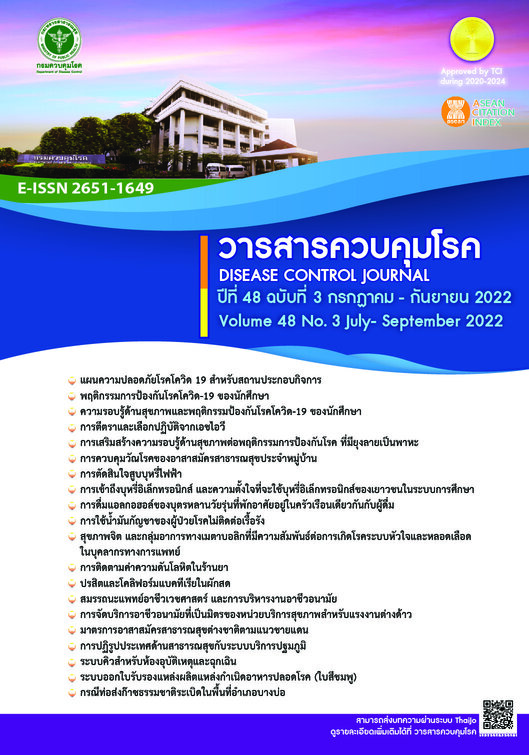Attitudes and knowledge of sixth-year pharmacy students on blood pressure monitoring in community pharmacies
DOI:
https://doi.org/10.14456/dcj.2022.51Keywords:
blood pressure monitoring, pharmacy student, attitudes, knowledgeAbstract
This cross-sectional study aimed to assess the attitudes and knowledge of the 6th year pharmacy students toward blood pressure monitoring in community pharmacies via an online self-administered questionnaire. One hundred and forty-seven pharmacy students responded the questionnaire (49.8% of an intended sample size). Of those respondents, 84.3% and 15.6% were studying at the public universities and private universities, respectively. Most of the respondents had positive attitudes toward the service of blood pressure monitoring in community pharmacies. However, an average score of knowledge related to the monitoring of blood pressure was 12.32±3.1 out of the total score of 23. The most incorrect answers included appropriateness of the device, interpretation of the measured blood pressure reading, maintenance of the device, and measurement technique. The 6th year pharmacy students had positive attitudes toward the blood pressure monitoring service in community pharmacies but their knowledge about blood pressure monitoring should be improved to provide services to patients as appropriate and most effective.
Downloads
References
World Health Organization. High blood pressure: a public health problem [Internet]. [cited 2019 Aug 18]. Available from: http://www.emro.who.int/world-health-days/2013/Page-2.html
Public Health System Development Group (TH). Prevelence of hypertension, diabetes, coronary artery disease, cerebovascular disease, COPD in 2016-2018 [Internet]. [cited 2019 Aug 22]. Available from: http://www.thaincd.com/2016/news/announcement-detail.php?id=13684&gid=1-020 (in Thai)
Thai Hypertension Society. Thai Guidelines on the Treatment of Hypertension 2019. Chiang Mai: TrickThink; 2019. (in Thai)
Kronish IM, Edmondson D, Shimbo D, Shaffer JA, Krakoff LR, Schwartz JE. A Comparison of the Diagnostic Accuracy of Common Office Blood Pressure Measurement Protocols. Am. J. Hypertens. 2018;31(7):827-34.
Hfocus News Agency. Ministry of Public Health increases access to blood pressure monitors by the people can assess their own risk. With starting to service 100 devices in government offices [Internet]. [cited 2019 Oct 29]. Available from: https://www.hfocus.org/content/2019/10/17964?fbclid=IwAR36A4hR-hGhrInmIN0WBxxiG0YzwKqarDLoBQBGsgEg2_uWLacnKE2QIYQ (in Thai)
Food and Drug Administration, Ministry of Public Health (TH). Guideline to assessing good pharmacy practice: GPP. Nonthaburi: Food and Drug Administration; 2015. (in Thai)
Pharcharaphon P. Standard of drugstores. Thailand: Nonthaburi: Food and Drug Administration; 2013. (in Thai)
The Pharmacy Council of Thailand. Announcement of the Pharmacy Council No. 18/2012. The core competency of pharmacy curriculum, the pharmacy council of Thailand. Nonthaburi: The Pharmacy Council of Thailand; 2012. (in Thai)
The Pharmacy Council of Thailand. Announcement of the Pharmacy Council No. 8/2011. The Standards of Pharmacy Professionals in Pharmaceutical Care 2011. Nonthaburi: The Pharmacy Council of Thailand; 2011. (in Thai)
Barrett R, Hodgkinson J. Quality evaluation of community pharmacy blood pressure (BP) screening services: an English cross-sectional survey with geospatial analysis. BMJ Open. 2019;9(12):e032342.
Ragot S, Sosner P, Bouche G, Guillemain J, Herpin D. Appraisal of the knowledge of hypertensive patients and assessment of the role of the pharmacists in the management of hypertension: results of a regional survey. J Hum Hypertens. 2005;19(7):577-84.
Downloads
Published
How to Cite
Issue
Section
License
Copyright (c) 2022 Disease Control Journal

This work is licensed under a Creative Commons Attribution-NonCommercial-NoDerivatives 4.0 International License.
Articles published in the Disease Control Journal are considered as academic work, research or analysis of the personal opinion of the authors, not the opinion of the Thailand Department of Disease Control or editorial team. The authors must be responsible for their articles.






